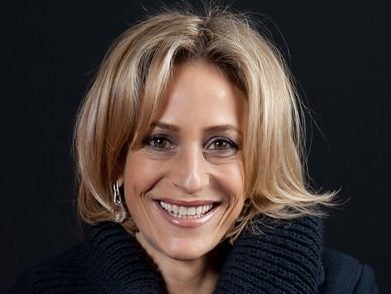
BBC presenter Emily Maitlis has revealed she “nearly gave up” on journalism earlier in her career as she thought she wasn’t “newsy enough”.
The Newsnight anchor also confessed she was once a “terrible reporter” who made “every mistake in the book”.
Maitlis is now one of BBC News’ top stars, having been promoted to the lead Newsnight presenter job in March. She first joined the broadcaster in 2001.
Last week she presented the BBC’s Conservative party leadership debate programme,which was watched by more than 5m viewers.
Speaking to broadcaster Emma Freud on BBC Radio 4’s One to One programme today, Maitlis detailed some of her slip-ups as a young reporter in Hong Kong, such as missing a key news line and leaving a microphone on a bus.
She added: “So many times I nearly gave up and I got really down about it and I thought I was just not made for it, not newsy enough.”
Maitlis worked for both US broadcaster NBC and Channel 4 News in Hong Kong earlier in her career.
Later in the programme, when asked about her addiction to journalism, Maitlis said: “We had this ongoing joke that every time you’re standing in the pouring rain, at a scene of horror with everything crashing around you, you start whispering: ‘Never again. I’m never doing this again.
“‘I’m never, ever doing this again. I’m never coming here, you’re never sending me here, I’m not working with you, I’m never, ever doing this again.’
“Everyone I know in the field says that. You go through such a horror and a hatred and a self-loathing and then of course it happens and it’s fine and you have a night’s sleep and two days later you’re itchy and mooching around the house waiting for the next bit of adrenaline.”
The presenter also spoke of her experiences covering tragedies such as the Manchester Arena bombing and Grenfell Tower fire, both in 2017.
When Freud asked if disasters became more exciting to her as a journalist when death tolls rose, Maitlis said it was “relevant” to reporters, adding: “If two people get killed, you probably don’t get sent.
“If a hundred get killed, you have no choice and so there is that awful moment where you have to work out the weight of the story by that kind of metric and it makes you a horrible person for asking.”
She tearfully went on to say she hated to hear of death tolls rising.
“The Manchester bombing, every time there was another kid or another mum and I- the story gets harder actually and I don’t at all like it.
“I remember on the night of Grenfell. There was a 13-year-old girl that went missing and we ended the broadcast by thinking that she’d been found and actually all I wanted to do that night, in the midst of the all the horror and upset, I wanted to feel that I ended that night by one piece of redeeming good news.
“So actually I think the opposite’s happened. I think I long for stories to be less impactful.”
Picture: BBC
Email pged@pressgazette.co.uk to point out mistakes, provide story tips or send in a letter for publication on our "Letters Page" blog
